There’s one thing that both anti-abortion and abortion-rights activists agree on. A shift is underway in Europe — in politics, prosecution and protest. Battle lines are drawn for what threatens to be a nasty fight, with both sides taking cues from the U.S. In Part 2 of a series, NBC News examines the debate.
***
WARSAW, Poland — The movement has a hashtag — they call it the #CoatHangerRebellion.
Activists for decades have decried the abortion laws in deeply Catholic Poland, which are among the most restrictive in Europe. Their anger has now boiled over.
A proposed law to ban abortion outright has sent thousands of Poles onto the streets, coat hangers held aloft and drawn on posters — a long-standing symbol of dangerous self-induced or back-alley abortions. The timing of the proposal and evocative imagery used by the protesters speaks volumes to a shifting battleground in Poland and beyond.
'Get Mad'
At 69 years old, Ewa Dabrowska-Szulc considers herself lucky to have come of age at a time when her three abortions were legal — a far cry from the current situation in her native Poland.
“We were lucky, we women �— as we call it — generations of The Beatles, meaning those who reached adulthood in the 60s, 70s,” she told NBC News. “We could enjoy the right to abortion ... It was just a part of our lives.”
That's a choice she would no longer have.
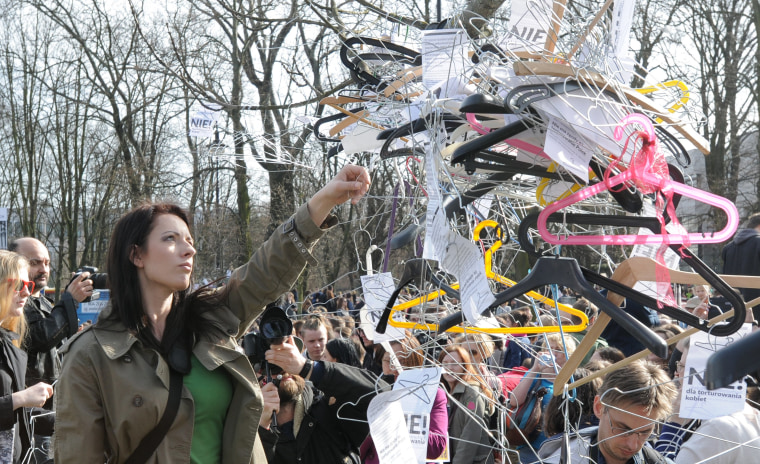
A law introduced in 1993 made abortion legal only under three narrow exceptions — and she says the situation would be made worse by the proposal to criminalize abortion under all circumstances.
“I believe that we women of almost 70 years old should tell the truth,” the mother-of-two said while clutching a poster at a rally in Warsaw earlier this month. “We had the right to decide — do we have a child or not?”
That’s why she was out on the streets embracing the Coat Hanger Rebellion — fighting to restore the rights she had for today’s young women.
“I hope that ... in 2016, the new generation of women would get mad.”
An Outright Ban?
Abortion is illegal in Poland except under three circumstances: in cases of rape, incest or when there is a serious threat to the mother or baby’s life.
When the restrictions were passed 23 years ago, the law was billed as a compromise; there was pressure from then-Pope John Paul II to perhaps go further.
And anti-abortion groups with overwhelmingly Catholic roots have been fighting to extend the limits ever since.
The proposal that sparked this Coat Hanger Rebellion was the latest salvo.
It was drafted by prominent activist Mariusz Dzierzawski, who accuses supporters of abortion rights of wanting to “kill the children." He believes neither cases of rape nor a pregnancy endangering a mother’s life justify an abortion.
That's why his organization submitted the “Stop Abortion” proposal last month, which aims to criminalize abortion under all circumstances and suggests penalties of between three months and three years in prison.
The proposed law would see Poland trump the Irish Republic and neighboring Northern Ireland — which is part of the U.K. — as the most restrictive in Europe for abortion. It also would make Poland just one of just a handful of places in the world with an outright ban.
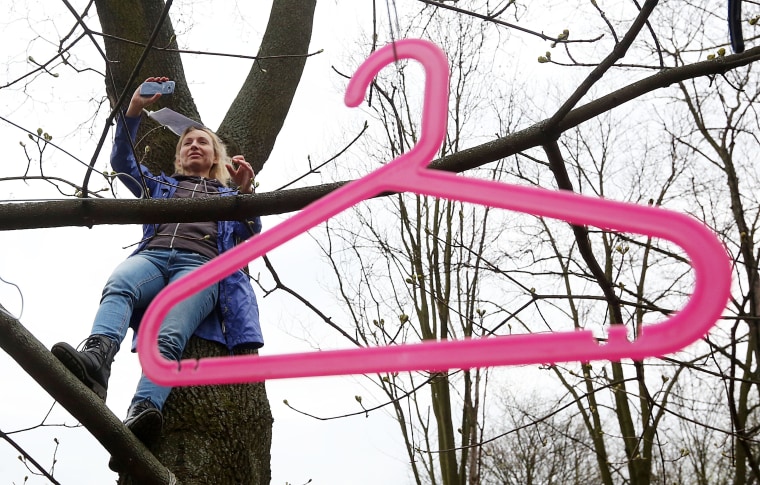
Dzierzawski told NBC News he believed the "Stop Abortion" draft law has a real chance of being approved and becoming a reality.
“Abortion is supported by the minority of the population in Poland,” Dzierzawski said.
“Stop Abortion” needs to collect 100,000 signatures in order for the proposal to be debated by lawmakers and given a parliamentary vote. Even abortion rights supporters concede they won’t be hard to come by in a country of 38 million people where 87 percent of the population is Catholic.
Related: You Can Be Jailed for Life for Getting Abortion in U.K.
After about two weeks, the proposal has gathered around 30,000 names.
"I'm not worried about the number of signatures," Dzierzawski said, predicting that all would go "very smoothly."
Church Walkouts
Poland’s influential Catholic Church was quick to urge its followers to back the “Stop Abortion” proposal.
A letter issued by the church dated March 30 heralded the need for the “full protection of human life." It was signed by two archbishops and a bishop.
“The protection of unborn life cannot stop at the current compromise expressed in the Act of January 7 1993, which in three cases permitted abortion,” the letter reads. “We ask people ... to take action aimed at the full legal protection of the unborn.”
The following Sunday — April 3 — priests across the country read the letter aloud during Mass.
Footage went viral of worshippers walking out in protest.
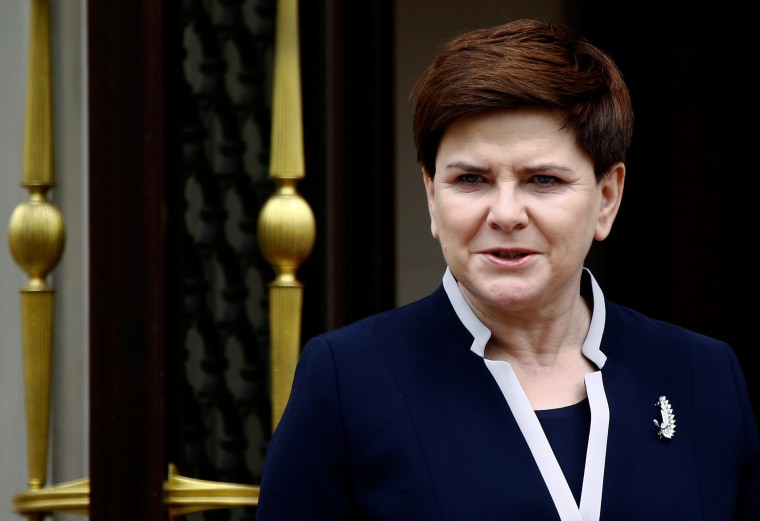
But it was the backing of Prime Minister Beata Szydło, who said she would personally support the draft law, that set the sparks of a rebellion fully alight.
In addition, the leader of Szydlo's ruling Law & Justice Party — Jaroslaw Kaczynski — suggested that the majority of his lawmakers also would back a full ban on abortion.
The real possibility that such a bill could pass has sent Poles onto the streets in the thousands protesting a return to the “medieval ages” captured by their symbol of choice: The coat hanger.
Two Kids, Three Abortions
For Dabrowska-Szulc, joining the movement was a no-brainer.
“My story as a fighter for reproductive rights is long and very, very sad,” she explained.
One of her earliest childhood memories was hearing her grandmother plead for the death of one of her siblings. Dabrowska-Szulc's mother didn’t have enough milk to breastfeed the baby.
“[As] a six or seven-year-old girl, I was thinking, 'how could one pray for God to take a child,'” she recalled. But growing up, she saw how her parents struggled to take care of four children.
“So I decided that I should have only two — a boy and a girl,” Dabrowska-Szulc said.
When she first got pregnant, Dabrowska-Szulc was a student with “other plans.” It wasn’t the “right time” to have children, she said. But she had options.
“You could go to state clinics and have [an abortion] ... for free,” Dabrowska-Szulc explained. “Just go to a doctor and say you are pregnant and you have no chances to support a child.”
That’s what she did — once, twice, three times. She later gave birth to two children — now aged 44 and 50.
She said she’s been fighting for women’s right to get abortions since 1989, when the first moves were made to restrict access in her country.
“As a woman who has had abortions it is completely incomprehensible,” she said. “I know how important it is for a woman not to be pregnant, to be able to decide about it. Raped women should have a choice, mothers of terminally ill children should have a choice!”
'Always the Worst Solution'
There are plenty of people on the streets of Warsaw, though, who disagree.
Lawyer Magdalena Korzekwa-Kaliszuk, a member of the conference of the Polish Episcopate, is one of them.
"The amendment to the law on abortion is in the interest of women,” she told NBC News. “Abortion is not good for a woman, because it is bad for physical and mental health.”
She echoed anti-abortionists' claims in Poland that fetuses with abnormalities are “deprived of the right to life,” saying that adoption is “always a better option” than abortion.
"Abortion is always the worst solution, because it leads to suffering women," she said.
1960s America
Members of the Coat Hanger Rebellion point to the fact that there are currently only five places worldwide that completely ban abortion under all circumstances: Chile, El Salvador, Nicaragua, Malta and the Holy See.
“I hope that they will not do this to Polish women ... A total ban on abortion is just cruel,” said Katarina Wieckiewicz, a lawyer at the Polish Federation for Women and Family Planning. “It’s barbaric. It cannot happen in a civilized world.”
Poland's National Health Fund says there were more than 1,800 abortions in 2014 compared to around 1,350 in 2013. But women's rights groups in the country say up to 200,000 abortions are performed illegally or abroad each year, according to The Associated Press.
Rights groups warn that the new law will further drive women seeking terminations underground — a situation where their lives could be put in danger.
“This would potentially cause real harm to many women and girls who are already facing extreme obstacles to accessing abortion or reproductive health-care,” said Hillary Margolis, a researcher with Human Rights Watch.
That’s why the movement’s use of the coat hanger is particularly salient — it “quite powerfully” evokes images from the U.S. pro-choice movement in the 1960s, according to Margolis.
“What it says is that these women are saying we really would be setting our country back a good 60 years, that this is bringing us so far backwards,” Margolis explained. “We know that outlawing abortion doesn’t stop abortion. It doesn’t stop women from seeking solutions.”
'Backsliding'
If Poland’s abortion law has been contentious for decades, why is it boiling over now? A lot of it has to do with the recent and broader political shifts in Europe, according to experts.
"Unfortunately we are seeing some potential backsliding,” Margolis warned. “Poland is the clearest example of a case where the laws are already incredibly restrictive and potentially becoming even more so."
While she acknowledged the undeniable influence of the Catholic Church in the current debate, she said attributing the movement to faith alone would oversimplify the issue.
Related: Women Share Their Abortion Stories
“It sort of all goes hand in hand with a real move towards a more conservative ideology and this idea of conservative and traditional values,” Margolis said. “It’s also part of this movement across Europe where there has been a real rise in right-leaning political parties gaining ground.”
Poland has been showing signs of a shift to the right for years, well before the latest proposal to ban abortion.
Activists’ alarm bells, though, started going off with greater urgency with the recent election of Poland’s conservative ruling Law & Justice Party.
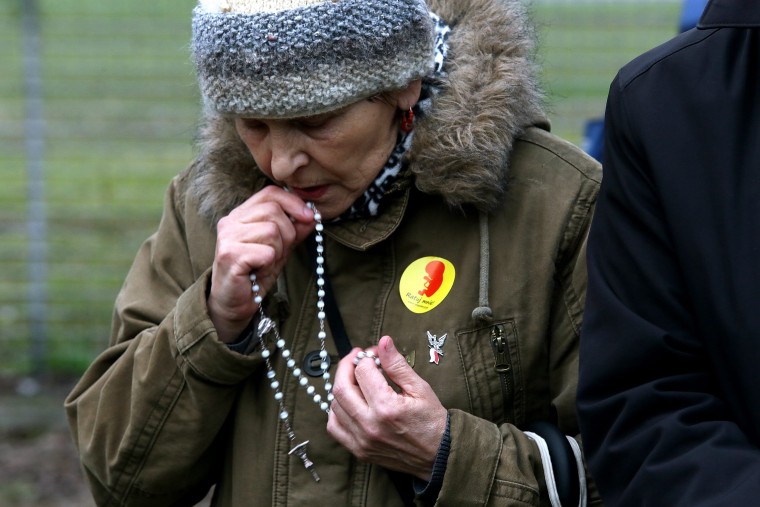
The party came to power on a platform of change — “good change” — and a return to traditional values.
Since then, the Law & Justice Party has been criticized for new media laws that broaden state control and accused of trying to weaken Poland's constitutional court.
Lech Walesa was among prominent former Polish leaders who published an open letter Monday on the front page of the daily Gazeta Wyborca accusing the current government of destroying democracy and a "usurpation of power" with its constitutional-court moves.
And then there’s the “Stop Abortion” campaign.
Only the Beginning
“Get your rosaries off my ovaries!”
One of the loudest voices in the Coat Hanger Rebellion has been that of Marta Nowak, a member of the relatively new and left-leaning Razem political party.
She told NBC News that the backing of ruling-party politicians for the proposed ban spurred her party to act.
Nowak described a frantic effort to publicize the initial demonstration against the draft law.
Thirty-six hours after that rally was announced, an estimated 10,000 people were in the streets of Warsaw on April 3.
“This protest was impressive,” she recalled.
Since then, solidarity rallies have been held in Warsaw, London, Oslo and beyond. The hashtags around the movement — #CoatHangerRebellion and #popieramdziewuchy, or "I support women" — have been used more than 8,500 times in two and a half weeks.
"We see a trend in Europe currently as sort of a general assault on women’s rights"
Nowak said she hopes that the “scale” of the protests will convince ruling party lawmakers like Prime Minister Szydlo to withdraw their support.
“We believe that we can affect it,” Nowak professed. “We will continue to protest.”
London-based Razem member Aleksandra Wolek marveled at how the issue has mobilized Poles who previously weren’t interested in politics.
A solidarity protest the 23-year-old law student organized in the British capital this month drew more than 300 people. What was notable at the rally was the diversity among the protesters — men and women, the elderly, middle-aged and even children.
“Its outrageous how much of an influence the Polish church has on politics in Poland,” Wolek said. “It’s not supposed to be like this in a democracy.”
The protesters are acutely aware, though, that this isn’t just about Poland. Two years ago, Spanish women protested proposed changes to that country’s abortion law — though that ultimately failed. In Northern Ireland, a woman recently was prosecuted after taking abortion pills.
“We see the importance of these abortion protests in a larger context,” Wolek said. “We see a trend in Europe currently as sort of a general assault on women’s rights ... This is why we think it’s essential to go out on the streets and protest.”
U.S. Links
As many as 9,000 people attended the latest Warsaw pro-choice demonstration on April 9 — with many others at rallies in other cities around Poland.
The numbers show that “not only women but the society as a whole has had enough,” said Krystyna Kacpura, executive director of the Federation for Women and Family Planning.
“We awoke women,” Kacpura said. “We awoke a fight — I hope.”
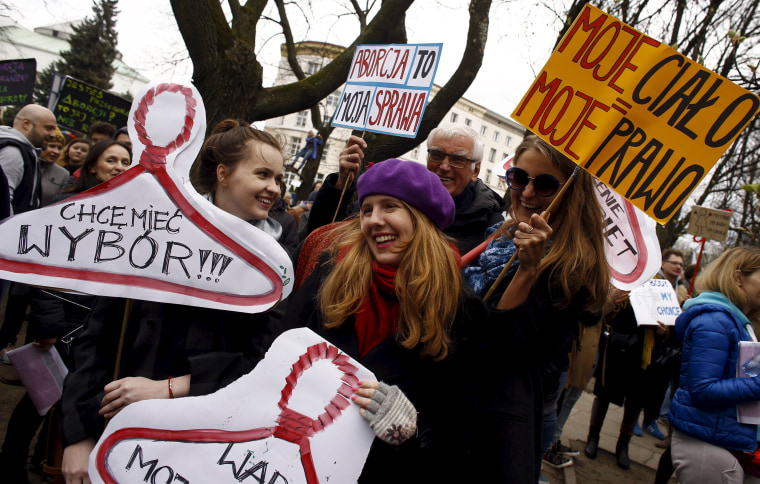
Every week her organization takes cases of women in need of legal abortions.
“The existing law is much more restrictive in practice than on paper,” Kacpura said. “We can say that right now we have almost total ban of abortion.”
She and others interviewed said doctors often will delay screening for medical anomalies, effectively running out the clock.
“They prolong the procedure to make it to be too late to perform legal abortion,” she said.
Kacpura is well aware of the evocative nature of the Coat Hanger Rebellion's imagery and is determined to make the voices of women heard.
“We will be screaming, we will be fighting as long as this law is existing," she said.
Complete Coverage: Europe's Abortion Fight
But Kacpura and abortion-rights activists suspect they might be battling a better-funded or at least better-organized competitor with roots thousands of miles away.
“Many many anti-choice organizations have started to act in this region — supported by huge Catholic organizations. Fundamentalist organizations with bases in the U.S.,” she said.
Kacpura said she recognized the U.S. influence in the language used by the anti-abortion activists in Poland. "But I can't prove it," she added.
It turns out, she’s right — but it’s no secret.
NEXT IN THIS SERIES: How an American Exports Anti-Abortion 'War' Strategy